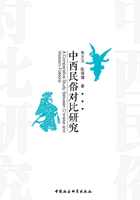
4. The Functions of Folklore
The existence and development of every subject depends on the role it plays in social life. Therefore, it is necessary to have the comprehensive knowledge of the social function of folk custom.
The function of folklore, a component of the organic system consisting of social life and relative culture, is its position in the social cultural system and the relationship between it and other cultural factors.
In general, folklore has the following four social functions:
(1)Education
Educational function refers to the enlightening and molding role that folklore plays in socializing process of individuals. Folks need to master the living patterns and standards passed from generations in which shape the experience and behavior ever since they are born. Then they become the participants and creators of their own culture as they grow up. Yet it is undeniable that they are always constraint in the culture.
All in all, human beings are the product of culture. Therefore, being a cultural phenomenon, folklore possesses significant status in individual socialization process. People are encompassed by folk norms all his life: he might be greeted with birth ritual the day he was born; then language is obtained when he imitates people who surround; interpersonal relationship is understood through protocols of appellation and communication; he marries according to the certain marriage customs; and specific funeral ritual held for him after his death. Folklore is to human beings what water is to fish.
(2)Normalization
Normative function is the binding effect that folklore has to individual behavior.
There exist many choices to fulfill human social needs. For example, people can eat by knives and forks or chopsticks even hands. The role of folk custom is to affirm and reinforce a given way according to specific conditions, making it a kind of collective standardized mode to ensure the regular advance of social life.
Social norms take on a variety of forms with rough divisions into four levels:law, discipline, morality and folklore among which the fourth is the earliest and comprehensive one.
Folklore is the social norm with the longest history. Engels once pointed out that in the primitive stage of social development, it was required to generalize the repetitive behavior of product manufacture, distribution and exchange with common rules, which first characterized by habit, later became law. The habit mentioned here is the original folk custom.
Folklore is the most constrained behavioral norm. It is admitted that the conduct code established by law is just a minor part that people must observe;however, folk custom is the invisible hand that virtually dominates people's behavior. And they unconsciously comply with the folk custom from the basic necessities such as food, clothing, shelter and transportation to common rituals of weddings and funerals, from social interaction to spiritual beliefs.
It is hard to realize the impact of folk custom specification in daily life, which hardly rouses folks' resistance. Therefore, the control of folklore is a“soft control”, the most formidably intensive one.
(3)Maintenance
Maintaining function refers to the unification of collective thought and behavior. The constant social change requires the continuous cultural adjustment made on the basis of internal and external variation. Folk customs, as a cultural inheritance, is bound to undergo continual offspring replication to keep the so cial continuity. Even in the largescale sudden social reform, changes are always local and gradient compared with the whole system, a means that effectively prevent cultural rupture to maintain the relative stability of social life.
For one thing, folk customs unify the behavior of social members, for another, they sustain the group or nationality's cultural psychology. Every nation or social groups, living in the specific natural conditions and social environment, has its own unique historical path, forming the particular collective psychology. Folk custom is the label for people to achieve group identity. For instance, overseas Chinese scatter in every corner of the globe, but they speak Chinese, eat Chinese food and celebrate Chinese traditional festival to maintain their own national identity.
(4)Relief
Relieving function means the entertaining, venting and compensative effect of folklore, enabling people to be relieved from stressful social life and psychology.
The apparent entertaining function of folklore provides opportunities for people to enjoy the culture they produce. To gain refreshment from heavy workload, folks need to be involved in proper recreations to repose themselves, enjoying lives by participating social activities. No nation in the world has no holidays, games, folk literature, art and sports, which are the desirable supplement of human life.
Folklore is also an outlet for people venting emotions. In social life, the individual biological instinct inevitably suffers from certain degree of physical or mental depression, which can be immensely destructive. Some folklore appears accordingly. For instance, ancient Romans drink and revel during Bacchanalia without everyday taboos. And this wild carnival festival is not rare in history, such as the Chinese Water-splashing Festival of the Dai Nationality, Nadan Festival of the Mongols etc. Other folk games, such as Rooster Fighting, Bull Fighting, Cricket Fighting etc. all can be relaxing. Besides, Chinese customs of teasing the newlyweds in the wedding or wails in the funeral are both ways unleashing mental energy to serve as emotional catharsis.
Finally, folklore can be compensative for people who are incapable of fulfilling their dreams in the harsh reality. Engels once mentioned that a farmer gain comfort and joy from German folk tales after daily exhausting work, discounting fatigue and imagining his humble house to be a fragrant garden.Such is a case of spiritual compensation. Similarly, people long for affection from folk love songs;folks forget sufferings from religious ceremony. And a variety of folk craft and art furnish people with beauty and hope which are the compensation people obtain from everyday life.
The above four are just the primary functions of the folklore. And it is necessary to note that folk culture varies and the study of its social function deserves further exploration.